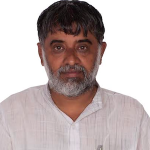 A.V. Balasubramanian obtained his MSc degree in Chemistry from Bangalore University and did a Post MSc diploma in Molecular Biophysics from the Indian Institute of Science, Bangalore. Later he studied Physiology and Biophysics at the State University of New York at Stonybrook. Since 1982 he has been involved in work relating to various aspects of Traditional Indian Sciences and Technologies and trying to explore their current relevance and potential. In 1995 he founded the Centre for Indian Knowledge Systems (CIKS), an institution devoted to exploring the contemporary relevance and applications of Indian Knowledge Systems, particularly in the area of sustainable agriculture.
A.V. Balasubramanian obtained his MSc degree in Chemistry from Bangalore University and did a Post MSc diploma in Molecular Biophysics from the Indian Institute of Science, Bangalore. Later he studied Physiology and Biophysics at the State University of New York at Stonybrook. Since 1982 he has been involved in work relating to various aspects of Traditional Indian Sciences and Technologies and trying to explore their current relevance and potential. In 1995 he founded the Centre for Indian Knowledge Systems (CIKS), an institution devoted to exploring the contemporary relevance and applications of Indian Knowledge Systems, particularly in the area of sustainable agriculture.
In CIKS he has been involved in the production of educational and training material on various aspects of Sustainable Agriculture as well as research on this topic drawing upon indigenous knowledge wisdom and practices. More recently he has also been involved in helping farmers to set up a large number of producer companies through which various activities relating to the production and marketing of organic produce are carried out as well as services for farmers are offered. He has been a member of several committees of the Government of India (Ministry of Science and Technology, Ministry of Rural Development and Ministry of Human Resources Development) as well as on the Editorial Board of several Magazines and Journals (such as the Journal of Ayurveda and Integrative Medicine). Besides agriculture he also has an active interest in other areas of Indian knowledge systems, including indigenous health and yoga as well as the epistemology of traditional knowledge systems. For his contributions in the area of indigenous traditions of Sciences and Technologies he was the recipient of an honorary doctorate awarded by the Gandhigram Rural University, Gandhigram, Dindigul district, Tamil Nadu, in 2010.
Currently he is the Director of the Centre for Indian Knowledge Systems and based in Chennai.
Abstract of the talk
This series of four talks will provide an introduction and overview to the following three themes:
The content and richness of indigenous knowledge, science and technology of agriculture.
The social organisation of knowledge and
The nature of knowledge systems and the methodology
In terms of the content of the knowledge an overview will be provided touching upon the knowledge base, the material resource base as well as the human resources base. We will trace in historical terms what is known about this knowledge at the turn of the 19th century when India was already under British Rule. Some specific domains of knowledge that could be discussed specifically with respect to the contemporary relevance would be – the system for water management, the productivity of crops as well as methods for weather forecasting. In terms of the social organisation of knowledge we would look into the Lok Parampara (the folk traditions) as well as the Sastric Parampara (classical traditions) and the links between the two of them as well as the importance of such a structure for the revitalisation of this knowledge. In terms of the methodology of the knowledge systems, we will attempt to provide an introduction to the nature of traditional knowledge and some of its basic features focussing on the following.
•The type and nature of parameters with which theories are made in traditional knowledge.
•Some of the important aspects in which traditional knowledge has a viewpoint that is different from what is accepted in modern western scientific methodology such as the idea of measurement, the idea of controlled experiments etc.
•The necessity and importance of comprehending traditional knowledge as an entire knowledge system.
The author would discuss and develop the view that these knowledge systems have a strong contemporary relevance and potential. This would not be an attempt to look back with nostalgia about – “the glory that was India” – it would rather make a statement that traditional knowledge, wisdom and practices should form some of the pillars on which we should be building the future of our agriculture and food security , for which we should protect and nurture the material and intellectual resource base of this knowledge system.
Video